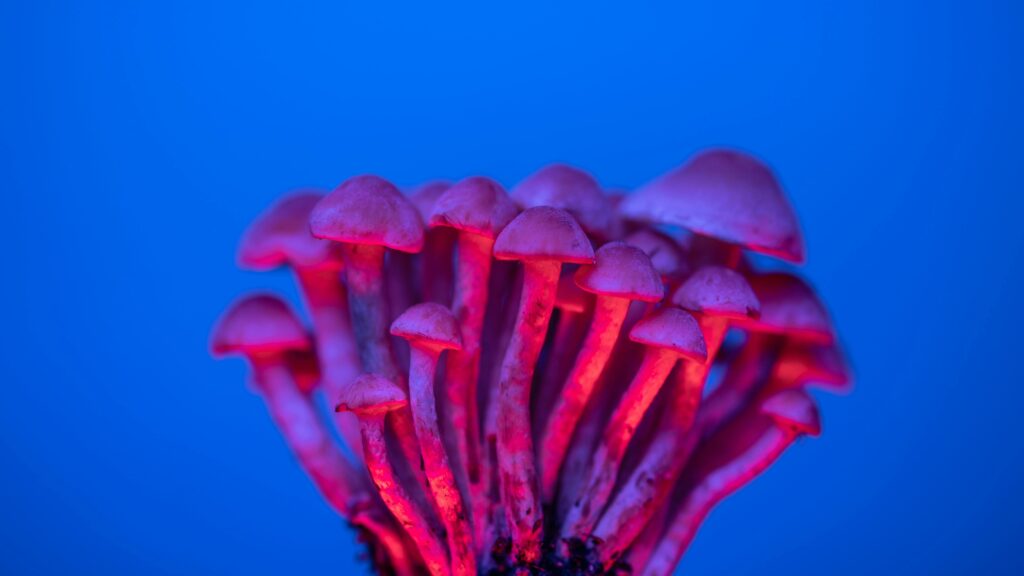
Hallucinogens are a group of psychoactive drugs that can cause hallucinations and other sensory disturbances. They are also known as psychedelic drugs or hallucinogenic drugs. These substances alter a person’s perception of reality, often causing vivid hallucinations and distorting their thoughts and senses, which can be intensified when using hallucinogens in high doses. There are several types of hallucinogens that produce different effects on the brain and body.
What are Hallucinogens?
Hallucinogens are substances that alter a person’s thinking, perception, and behavior. They work by disrupting the normal functioning of the brain’s serotonin system, which is involved in mood, perception, and cognition. The effects of hallucinogens can vary depending on the specific drug and the dose taken. Some common examples of hallucinogens include LSD (Lysergic Acid Diethylamide), psilocybin (found in certain mushrooms), and mescaline (found in the Peyote cactus).
Types of Hallucinogens
There are different types of hallucinogens, including classic hallucinogens and dissociative drugs. Classic hallucinogens include LSD, psilocybin, and mescaline, while dissociative drugs include ketamine and PCP (Phencyclidine). Each type of hallucinogen has its own unique effects and potential risks.
Effects of Hallucinogens
The effects of hallucinogens can vary widely depending on the drug and the dosage. Common effects include hallucinations, sensory distortions, changes in perception of time and space, and altered thoughts and emotions. These substances can also cause intense mood swings, increased heart rate, elevated blood pressure, and at high doses, may lead to serious health issues, as reported by the National Institute on Drug Abuse. The effects of hallucinogens typically begin within minutes to an hour after ingestion and can last for several hours.
Long-term Effects of Hallucinogen Use
Long-term use of hallucinogens can have both physical and psychological effects. Some individuals may experience persistent visual disturbances, known as hallucinogen persisting perception disorder (HPPD), even after they have stopped using the drug. Other potential long-term effects include memory problems, impaired coordination, and changes in mood and personality. Additionally, regular use of hallucinogens can lead to tolerance, meaning that higher doses of the drug are needed to achieve the same effects.
Can Hallucinogens be Addictive?
Hallucinogens are not considered physically addictive, meaning that individuals do not experience physical withdrawal symptoms when they stop using them. However, they can be psychologically addictive. Some individuals may develop a psychological dependence on hallucinogens, experiencing cravings and an inability to stop using despite negative consequences, which can be seen as a form of drug addiction. The use of hallucinogens can also be associated with other substance abuse and mental health disorders.
Signs and Symptoms of Hallucinogen Addiction
Signs of hallucinogen addiction can vary depending on the individual and the specific drug being abused, illustrating the personalized nature of drug addiction and the need for tailored interventions. However, some common signs include an increasing preoccupation with the drug, neglecting responsibilities and relationships, and experiencing withdrawal symptoms when attempting to quit. Other signs may include tolerance to the effects of the drug, an inability to cut back or stop using, and engaging in risky behaviors while under the influence of hallucinogens.
Withdrawal from Hallucinogens
As previously mentioned, physical withdrawal symptoms are not typically associated with hallucinogen use. However, individuals who have become psychologically dependent on these substances may experience withdrawal symptoms such as cravings, irritability, and mood swings when they attempt to stop using, highlighting the challenges of hallucinogen withdrawal. It is important for individuals struggling with hallucinogen addiction to seek professional help to manage these symptoms and address underlying issues.
Treatment for Hallucinogen Addiction
Treatment for hallucinogen addiction typically involves a combination of therapies and support. Inpatient or outpatient treatment programs can provide a safe and supportive environment for individuals to address their addiction and learn healthy coping mechanisms. Behavioral therapies, such as cognitive-behavioral therapy and motivational interviewing, can help individuals identify and change their patterns of drug use. Support groups and aftercare programs are also essential for ongoing recovery and relapse prevention.

Common Hallucinogens and their Effects
LSD (Lysergic Acid Diethylamide)
LSD is one of the most potent hallucinogens, known for its powerful hallucinogenic effects. It can alter a person’s perception of reality, causing visual and auditory hallucinations, as well as changes in thoughts and emotions, especially when taking hallucinogens in high doses. The effects of LSD can last for up to 12 hours.
Ketamine
Ketamine is a dissociative drug that can produce both hallucinogenic and anesthetic effects. It is commonly used as a veterinary anesthetic but is also abused recreationally for its hallucinogenic properties. Ketamine can cause hallucinations, memory loss, and a feeling of detachment from one’s body and surroundings.
PCP (Phencyclidine)
PCP is a powerful hallucinogen that can produce intense and unpredictable effects, making it a topic of concern for the National Institute on Drug Abuse. It can cause hallucinations, delusions, and feelings of dissociation from one’s body and reality, effects that are exacerbated by high doses of the drug. PCP use is associated with aggressive and violent behavior, as well as self-harm and suicide attempts.
Recognizing and Treating Hallucinogen Abuse
Signs of Hallucinogen Abuse
Recognizing the signs of hallucinogen abuse can help individuals get the help they need. Some common signs include changes in behavior and appearance, social withdrawal, neglecting responsibilities, and engaging in risky behaviors. Individuals may also experience difficulties in school or work, as well as problems in their relationships.
Effects of Hallucinogen Abuse on Mental Health
Hallucinogen abuse can have a significant impact on mental health. These substances can trigger or worsen existing mental health conditions, such as anxiety, depression, and psychosis. Prolonged use of hallucinogens can also lead to cognitive impairment and memory problems.
Treatment Programs for Hallucinogen Abuse
There are various treatment programs available to individuals struggling with hallucinogen abuse. Inpatient treatment centers provide intensive care and support, while outpatient programs offer flexibility for individuals who do not require round-the-clock supervision. Treatment typically involves a blend of therapies, support groups, and medication-assisted treatment when necessary.
Availability and Risks of Hallucinogens
Psychedelic Drugs
Psychedelic drugs, such as LSD and psilocybin, are illegal in most countries, including the United States, a stance supported by data from the National Survey on Drug Use and Health. However, these substances are sometimes used recreationally or for spiritual purposes. The availability of psychedelic drugs can vary depending on the region and the black market.
Salvia
Salvia is a hallucinogenic plant that is legal in some countries but may be restricted in others. It can produce intense hallucinogenic effects, including visual distortions and a sense of detachment from reality. However, salvia is considered to have a high potential for misuse and can be dangerous when used without proper knowledge and precautions.
Peyote
Peyote is a small cactus that contains mescaline, a powerful hallucinogen. It is used in certain Native American religious ceremonies but is illegal for recreational use in most countries. The use of peyote can have a profound impact on an individual’s perception and consciousness, resulting in altered states of mind and spiritual experiences.
Q: What are hallucinogens?
A: Hallucinogens are a diverse group of drugs that cause alterations in perception, mood, and cognitive processes. They are also known as psychedelic or mind-altering drugs.
Q: Are hallucinogens addictive?
A: Hallucinogens themselves are not considered to be physically addictive, but the National Survey on Drug Use and Health reveals that the misuse of such substances can lead to serious health issues. However, some people may develop a psychological addiction to the effects of these drugs and have difficulty stopping their use, a concern that has been echoed by the National Institute on Drug Abuse.
Q: How do hallucinogens affect the brain?
A: Hallucinogens work by disrupting the normal functioning of neurotransmitters in the brain, such as serotonin. This leads to changes in perception, mood, and thought processes.
Q: What are the effects of hallucinogens?
A: The effects of hallucinogens vary, but common experiences include sensory distortions, hallucinations, altered sense of time, and feelings of euphoria or anxiety.
Q: Can hallucinogens cause addiction?
A: While hallucinogens themselves are not typically physically addictive, some people may develop a psychological addiction to the effects and use them regularly despite negative consequences, demonstrating the complex nature of substance use and addiction.
Q: What are the symptoms of hallucinogen abuse?
A: Symptoms of hallucinogen abuse can include increased tolerance, withdrawal-like symptoms, continued use despite negative consequences, and neglect of responsibilities or relationships.
Q: How do dissociative drugs work?
A: Dissociative drugs work by disrupting the normal functioning of the brain’s neurotransmitters, particularly glutamate. This leads to feelings of detachment from oneself and the environment.
Q: Can hallucinogens cause withdrawal symptoms?
A: While hallucinogens themselves do not typically cause physical withdrawal symptoms, some people may experience psychological symptoms such as cravings and depression when stopping their use.
Q: How are hallucinogen use disorders treated?
A: Hallucinogen use disorders can be treated through a combination of behavioral therapy, counseling, and support groups. It is important to seek help from a qualified treatment provider.
Q: What is the potential for abuse of hallucinogens?
A: Hallucinogens have a lower potential for abuse compared to some other drugs, but this does not mean they are without risk, according to the National Institute on Drug Abuse. Regular use of hallucinogens can lead to psychological dependence and negative consequences.










